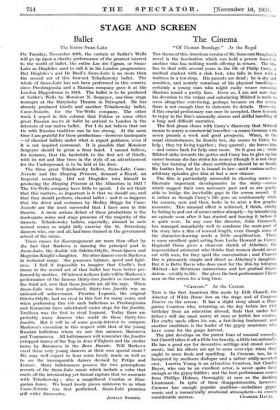"Caravan." At the Curzon This is the first American film
made by Erik Charell, the director of White Horse Inn on the stage and of Congress Dances on the screen. It has a slight story about a Hun- garian Countess who, returning on the day before her 21st birthday from an education abroad, finds that under her father's will she must marry at once or forfeit her estates. Her crafty uncle offers his son, a fast-living lieutenant, and another candidate is the leader of the gypsy musicians who have come for the grape harvest.
The plot develops on the purest lines of musical comedy, but Chard takes it all a little too heavily, a little too seriously. He has a good eye for decorative settings and crowd move- ments, but his effects are apt to seem over-ripe when they ought to seem fresh and sparkling. In Caravan, too, he is hampered by mediocre dialogue and a rather oddly-assorted cast. Loretta Young is an attractive Countess, but Charles Boyer, who can be an excellent actor, is never quite fiery enough as the gypsy fiddler ; and the best performance comes from Phillips Holmes, thoroughly at ease as the dashing Lieutenant. In spite of these disappointments, however, Caravan has enough popular qualities—melodious gypsy music and a romantically emotional atmosphere—to ensure






































 Previous page
Previous page